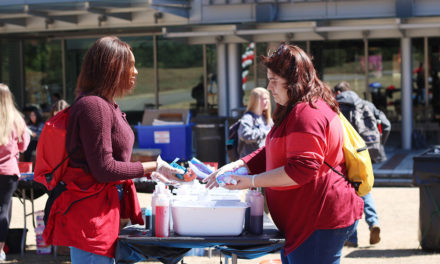HIND MALIK | STAFF WRITER
This year for Halloween, I will be a young Congolese woman….
My skin will be rich Black, like the brilliant color of roosted coffee beans. It will be youthful, smooth and radiant. I’ll braid my hair then wrap a scarf around it except for few strands that rebel confinement by my scarf. They dangle freely framing my round face. I am proud of my locks. They say hair is a woman’s crown. My scarf will be yellow, purple, and red like the fall trees and so will be my dress that falls short brushing over my knees. My teeth are large and white. They are shiny too like the diamonds in our backyard. My eyes are big and bright. My teacher at school prophesied a bright future ahead of me just by looking into my eyes. I borrowed them from my mother. My mother’s eyes are big still but they are no longer bright since the day the soldiers took my father and young brother away. She still waits on their return, but we all know that they are dead. See, the second civil war in the Democratic Republic of Congo which began in 1998 took the lives of more than 5.4 million human. It was the deadliest war since World War II.
Many people were mutilated and tortured but the worst barbaric cruelty was the use of violent gang rape by soldiers as a weapon to terrorize people and impose their power and control. It was their way to dehumanize, demoralize, and break down tribes and communities in the region. Women in DRC are the backbone of society. They have both crucial productive and reproductive value. So to destroy them physically and psychologically inflicts long term damage on these communities. Women were repeatedly gang raped in front of their families, then abducted as slaves for months where they were constantly raped and abused.
Most often, those who survive rape have to be hospitalized and endure numerous surgeries to reconstruct their damaged genitals and other related injuries. However, many do not receive the needed medical attention. Psychologically injured, some are left pregnant while others suffer from diseases like Fistula, the inability to control urination due to vaginal damage. Some of these women are also infected with HIV and other sexually transmitted diseases. Sadly, upon their return to their villages, they are shunned by their husbands, families, and communities. Denied by society, they became the target of constant harassment and rape by their own community members. But the war is over now, I assure my worried mother as I prepare to leave. It has officially ended in 2003. So I put on my slippers and step out into the busy street of our neighborhood. It is right before sunset.
By the time I knock on your door, my colorful dress is now muddy and brown. It is ripped and torn.
My scarf is gone and so is one of my slippers. My bright eyes are now dim like my mother’s. Their shine is spoiled and a bitter mix of anger and fear possesses them. My youthful skin aged a decade or two. It is scratched and bruised like the stripped gold mines behind our old village. I am in pain but I cannot cry. Like the mines, my tears and emotions are depleted. I grieve in silence as red paint runs down my legs. My diamonds are now stained with blood and my crown is forever seized. At your door, I am a young Congolese woman. I was raped but you will never know that because I am a well-kept secret here in the Democratic Republic of Congo; the rape capital of the world as declared by the United Nations. To you, the war might be over, but its ghost lives to haunt us down in every corner.
Trick or Treat…



